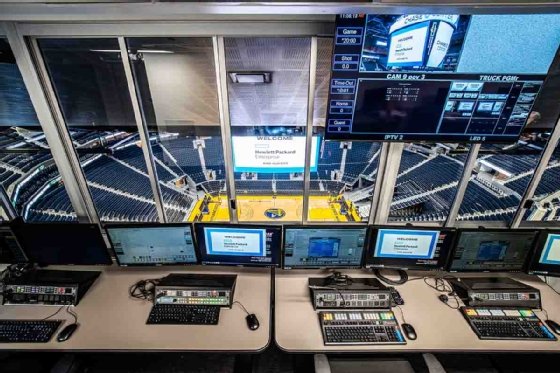
Getty Images/iStockphoto
Warriors joins other NBA teams in building smart arenas
The Golden State Warriors installed 250 Wi-Fi 6E access points in Chase Center to deliver high-speed internet almost anywhere in the arena. Faster networks are a trend in the NBA.
Demands on sports stadiums' Wi-Fi are growing, and the Golden State Warriors want to keep up. The NBA team recently deployed a high-speed wireless network in its home arena, Chase Center, to ensure a quality connection for internet-savvy fans.
Chase Center in San Francisco is one of several NBA venues turning to technology to make games more enjoyable for fans who demand solid internet connectivity. For the NBA teams, speedy wireless networks in the high-tech stadiums can also gather useful information on fan activity.
Consulting firm PwC is working with three NBA arenas to install high-tech capabilities. All want to continue enhancing them to interact with fans and help with facility management, said Mark Borao, partner at PwC. PwC partners with Microsoft Azure to build the smart venues.
The Warriors deployed 250 HPE Aruba Wi-Fi 6E access points to ensure fans could access the internet from almost anywhere in Chase Center, Warriors Vice President of Technology Daniel Busilovsky said. Wi-Fi 6E is a step up from Wi-Fi 6 because the former has upload speeds five times faster than the latest technology.
On opening night in October, the peppier network let the Warriors stream an augmented reality image on their phones. Fans could wear the Warriors' four championship rings on their fingers and share the photo on social media, Busilovksy said.
"It's our job to provide that connectivity so that they're able to do all of that but then also just use their phone like they expect," he said.
The upgraded network also offers faster access to the Warriors' smartphone app, which lets fans connect socially and commercially. It features stats, trivia and play-by-plays, and users can also buy tickets, flights and food. Through a partnership with food-order company DoorDash, fans can pre-order meals for pickup, Busilovsky said.
The smart venues that Borao builds with Microsoft include an Azure Digital Twin, a complete 3D digital replica of the stadium. The virtual model presents live data with help from sensors attached throughout the building. These sensors track temperature, humidity, sound and movement as well as funnel data to a machine-learning algorithm. The model notifies management of any unusual behaviors before a system fails.
"By using sensors and humans, you can radically bring down your facility's management costs and just make the place safer," Borao said.

A few weeks ago, he spoke with another NBA owner considering constructing a smart venue. Two months ago, Borao talked to another basketball team owner who wanted to install seat sensors to detect fan cheering levels. Using the sensors, the team could distribute loyalty points to the most enthusiastic fans, Borao said.
"The sensor is so sensitive that it can detect whether you're cheering or whether it's just the crowd noise," he said.
PwC did not disclose team names due to privacy agreements.
Building smart communities
Chase Center is a smart arena aiming to become what Borao calls a smart community. Venue owners want to build high-tech districts to foster community and commerce around a particular sports brand, he said.
"They're [venue owners] looking to buy and enhance the property around the stadium so that they can deliver great experiences for the fans," Borao said.
These communities include retail, restaurants and hotels that cohabitate well with the brand, he said.
The Warriors' smart community includes Chase Center and Thrive City, an 11-acre plot housing shops and restaurants. Wi-Fi 6E is only deployed in the arena because regulators have not authorized it for outdoor use, Busilovsky said.
PwC is collaborating with developers to build a smart community in California, Borao said. The district will have the largest solar implementation west of the Mississippi and acreage for growing produce for farm-to-table endeavors.
"They want to do this in a very sustainable way," Borao said. "They're not looking to just build up a bunch of concrete. They're really looking to do something different and unique for the community."






